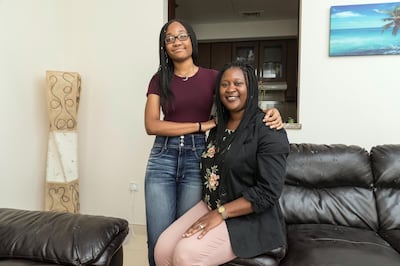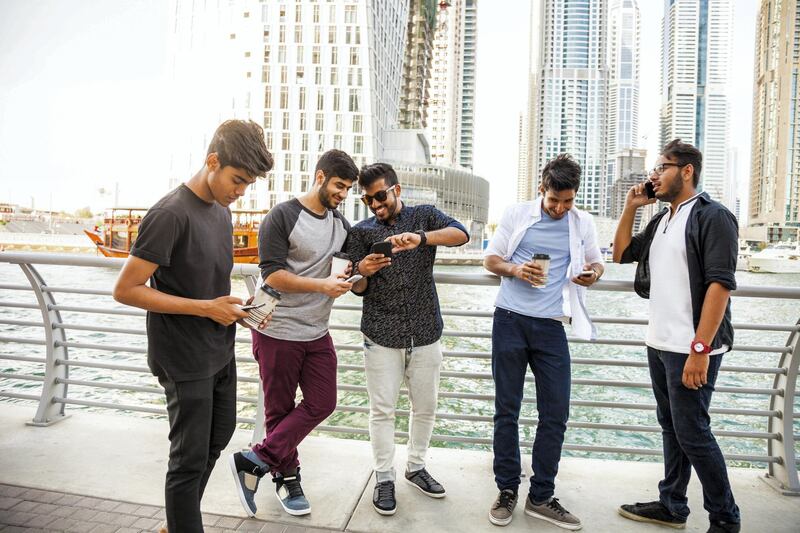Are they excited, engaged and energised? Or bored, disillusioned and understimulated? Mollycoddled and overly protected, or stressed and overly pressured? Teenagers in the UAE have so many labels and stereotypes attached to them, it’s a wonder they don’t baulk under all the criticism.
Community living is particularly popular in the UAE, and it is standard for every community to have at least one Facebook group that encourages residents to communicate with one another. These online platforms cover everything from the sale of a plant pot to questions – and answers – about the best place to go for a shawarma. And often, somewhere between all those inquisitive threads, you'll find long rants about the behaviour of teenagers.
“I have just encountered five rude and ignorant young male teenagers in Mira shopping centre,” writes one resident of the Mira Townhouses Community in Dubai. “Absolutely astounded at their lack of respect having been asked by security to leave. Their response was there is nowhere else to go.”
"A group of loud teenagers have been hanging out at the food court downstairs and leaving their trash everywhere and creating a loud, hostile atmosphere. Where are their parents, I'd like to know," writes a resident on a Facebook page for inhabitants of Sun and Sky Towers on Reem Island in Abu Dhabi. "When my son is a teenager, if I ever catch him doing this, he'll be lucky to see the light of day again," writes a father who lives in Dubai's Greens community.
And with every post, dozens of comments by others follow, lambasting the behaviour of teenagers, in general. The majority seems to believe that young people here think they can get away with anything and are out of control. Not all parents, however, would agree. “I’ve noticed that on our community’s Facebook page, people can be really critical of teenagers,” says Janelle Laurent, a Canadian mother of two who lives in Dubai. “There’s so much negativity towards them, always assuming the worst of them.”
This type of attitude spreading across social media, says Laurent, can be harmful for teens; it makes them feel like everyone is against them, and that they're almost expected to misbehave. Janelle and her husband, Claudius, have begun taking what they read on these Facebook groups and turning it into "talking points" at home with their own teenager, 15-year-old Sierrah.

“We can’t say all teenagers have a problem. The community is saying all teenagers out there are doing mischief, but I know that’s not the case. We use the issues that neighbours bring up [such as teenagers staying out until the early hours of the morning, or disrespecting an adult or security guard, or littering] to discuss things at home, and to be clear on what we expect from Sierrah,” explains Laurent.
The idea that it takes a village to raise a child applies to older children and teenagers, and not only to little ones, maintains one mother of three boys who lives in the Mira community in Dubai. It is based on that adage that she set up a group on WhatsApp for parents to join, as a sort of neighbourhood teen-watch. It is almost like having 45 sets of eyes out there watching out for her child, she says, rather than just her own.
"Some people had threatened to go to the police to complain about the behaviour of teenagers in our community, and that's taking things really far," says the mother, who is from the UK, and wished to remain anonymous. "So I felt I needed to do something."
If kids are up to no good, parents can stop them or steer them in the right direction, if they only know what is going on. “I would really hope that the community would support me in trying to raise my child in the correct way, not call the police, because my almost-13-year-old made a stupid mistake – because he is sometimes capable of making some pretty stupid errors of judgement, like most teenagers.”
The teen-watch group shares information on where their kids are, and with whom, making it difficult for teenagers to get away with lying to their parents. In the few months since it’s been set up, the group has been able to get the right culprits to clean up litter in the park, stop some teens from throwing stones at security guards and caution a group of boys from riding their bikes on the street in the fog, without their helmets on.
What parents need to remember, says Ann Kuis, a counsellor at Lifeworks Dubai who is raising a 14-year-old son and a 16-year-old daughter, is that teenagers can get themselves into trouble no matter where they are, and that expat parents cannot assume that just because they are in the UAE, adolescents will not face the same issues and temptations that they might face back in their home countries.
“Parents give their teens more freedom here, as they don’t have to worry about things like gangs with knives, or teens being mugged and attacked so that their phones or money are stolen,” says Kuis. “It’s not as likely here, but it doesn’t mean you should let your guard down as a parent.”
Laurent and her husband agree. "Some parents we've spoken to seem to think it's so secure here that they can allow kids more freedom, but kids can get into problems anywhere in the world; kids are born to break the rules," says Claudius, an airline pilot with Fly Dubai.
Chris Panning from the UK disagrees that teens in the UAE have more freedom than they do back in their home countries. “If I wanted to see vandalism and yobbish behaviour with foul language, I would have stayed in Britain,” says Panning, a civil engineer. “I don’t want to see that here from teens, and I don’t expect to, so when I do, the immediate reaction is to make sure those teenagers pay and learn a lesson.”
Admittedly, Panning is a father of an 11-year-old, so he has yet to navigate the adolescent years. He insists, however, that his son will be kept on a tight leash as a teenager. “This is a country with people from all over the world, from different cultures, each of them raising their children with different principles and rules,” he says. “The advantage is having your children meet kids from all over the world. The disadvantage, is that what goes in your home might not work in someone else’s, and teens get mixed messages. It can’t be easy for them, nor their parents.”
_____________
Read more:
The growing problem of negative body image in the UAE
Why stressed-out teens are turning to yoga to maintain their mental and physical health
‘The silent epidemic’: experts warn that troubled teens are not getting help they need
_____________
Sierrah has found a way to remove herself from the temptation of misbehaviour. She plays a number of sports, practises the piano and paints. She babysits to make some money and even tries to sell her paintings. "It's a fun experience growing up as a teen here," she says, having also lived in Canada, St Lucia and India. "There are so many activities to take part in and so much to do, but I feel that teens my age are not interested in that.
"They are interested in partying, popularity contests and who their friends are – they just want to have fun and be free and not think of the future. It's easy to fall into that trap, and I have to make a conscious effort not to." What helps the most, says Sierrah, is knowing that her parents give her the benefit of the doubt, and show her that they're on her side.





